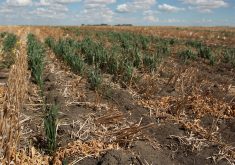Want to expand your farm for the next generation? Want to buy out some of your landlords? Want to work your way out of a difficult financial situation? A Canadian company called Area One Farms partners with producers to meet these sorts of objectives.
The company has relied on word-of-mouth advertising and even though it has been running for seven years, most producers have never heard of what it offers. According to chief executive officer Joelle Faulkner, it has $250 million invested with 18 farm operations in Alberta, Saskatchewan, Manitoba and Ontario.
Read Also

Proactive approach best bet with looming catastrophes
The Pan-Canadian Action Plan on African swine fever has been developed to avoid the worst case scenario — a total loss ofmarket access.
It’s an equity-based model in which Area One Farms becomes an equity partner in the farm. Farmers get 100 percent of the income and appreciation from their portion of the joint venture, plus 15 percent of the income and appreciation from the portion owned by Area One Farms.
In addition to the land, Area One Farms will also share in the cost of equipment and grain storage. Each deal is designed around the needs of the particular farm operation. No rent or other expenses are charged by Area One.
The initial agreement runs for 10 years at which time the farmer can renew or buy out as much of the joint venture as he can afford. Area One never owns land by itself. The land is either in a joint venture or it’s sold to another farmer.
Faulkner says the biggest challenge has been finding investors. Most private investors prefer the model where they buy land and rent it out. However, some institutional investors are comfortable with becoming equity partners, realizing the deal allows them to do well over the long term.
“By carefully and slowly finding investors, we have been able to maintain our farmer-centric approach,” says Faulkner.
It is now at a stage where it is able to enter into more equity partnerships.
The farmer never deals with any of the investors, but there is a very close relationship with Area One Farms. In fact, Area One has to approve the budget and crop plan as well as capital decisions. It keeps the books, pays the bills and offers advice.
The traditional ways to expand the farm are to take on debt and/or rent more land. There’s a limit to how much you can borrow and debt obligations can be tough to service in a bad year. Renting land can lead to significant losses and rental agreements are seldom secure for more than a few years.
Forming a joint venture with an equity partner is a very different approach. You certainly give up some autonomy, but you don’t have interest and cash rent payments to worry about. Sometimes a farm’s existing land base is rolled into the joint venture and sometimes it isn’t. Each deal is a bit different.
While Faulkner says Area One is happy to have more farm partners, they are selective. They look at a farm’s financial and cropping history before agreeing to be part of a joint venture. And in certain regions, farmland is just too expensive for their liking.
Equity partnerships may never be a mainstream practice in Canadian agriculture, but for some producers it appears to be an option worthy of consideration.
Kevin Hursh is an agricultural journalist, consultant and farmer. He can be reached by e-mail at kevin@hursh.ca.

















